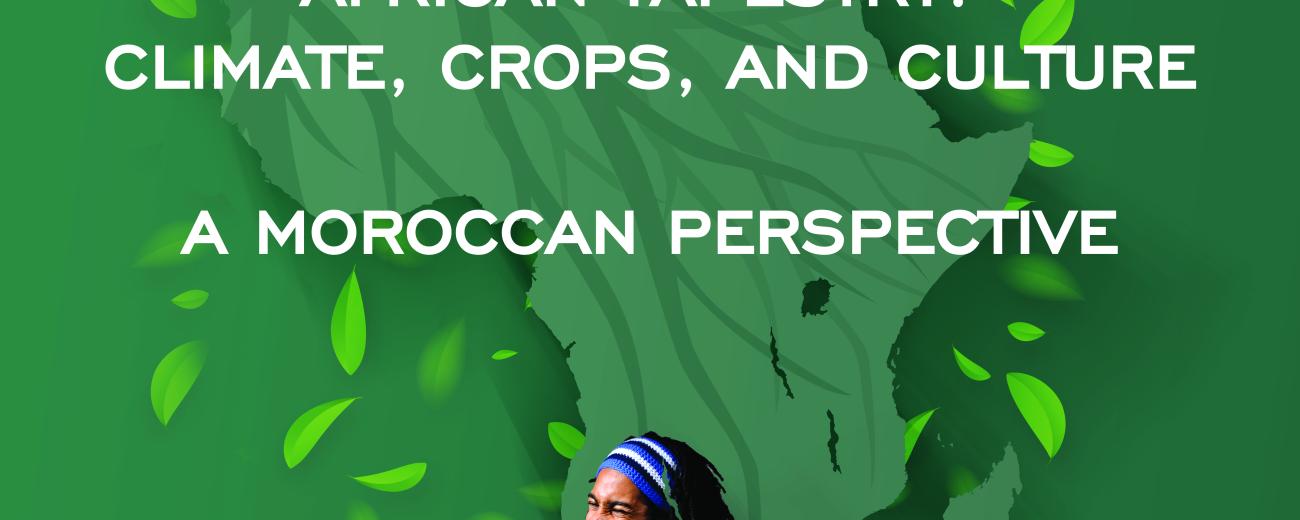
African tapestry: Climate, crops, and culture - A Moroccan perspective

Key information
- Date
- Time
-
5:00 pm to 9:00 pm
- Venue
- SOAS University of London
- Room
- Brunei gallery lecture theatre
About this event
The event organised in collaboration with Embassy of the Kingdom of Morocco to the United Kingdom of Great Britain and Northern Ireland brings together scholars, practitioners, policy makers, students, and enthusiasts from diverse backgrounds.
Within the overarching theme of “African Tapestry: Climate, Crops, and Culture – A Moroccan Perspective”, this event seeks to shed light on Morocco’s distinctive contributions to addressing the aforementioned issues.
5:00pm to 5:05pm: Opening Remarks
Professor Adam Habib, Director of SOAS
5:05pm to 6:15pm: Panel 1 - Harvesting Solutions: What role can Africa play in climate action and in Agri-food Systems Transformation for a Sustainable Future?
Africa is often considered as the world’s breadbasket with an estimated 60% of the world's uncultivated arable land located on the continent. The agriculture sector accounts for 35% of Africa's GDP and employs more Africans than any other sector. However, the continent remains a net importer of food and still faces a multifaceted challenge in eradicating hunger.
Global supply disruptions have exacerbated existing pressures on African food systems, with a disproportionate impact on the most vulnerable communities. Also, despite being the least responsible for the global climate crisis, African countries are facing significant consequential economic challenges, potentially reducing their GDP growth rate by up to 64% by the end of the century.
In this session, the speakers will explore Africa’s potential to tackle the interconnected effects of climate change and food systems transformation to achieve two crucial Sustainable Development Goals: zero hunger and climate action. This panel will also shine a spotlight on Morocco’s approach in driving sustainable food system transformation while taking decisive climate action at the continental level.
Confirmed speakers
- Dr. Anouar Jamali – CEO OCP Africa
- Dr. Donald Kelechi Madukwe, Head agronomy OCP Africa - Nigeria
- Mr. Menghestab Haile, Regional Director for Southern Africa - World Food Programme WFP
- Zitouni Ould Dada, UN Expert on climate change, food security and sustainability
- Dr. Annabel de Frece, Senior Lecturer in Sustainable Development in the Centre for Development, Environment and Policy - SOAS
Moderator: Dr. Wayne Dooling, Chair, Center of African Studies (SOAS)
6:15pm to 7:15pm: Building bridges of understanding: Morocco’s unique interfaith and multicultural dialogue
A One to One Conversation between Dr. Zeinab Badawi and Dr. Ahmed Abbadi
Situated at the nexus of myriad civilisations, Morocco stands as a land of harmony, tolerance, and peace. Its history and cultural lineage have woven a rich mosaic where diversity and religious coexistence don’t just cohabit but are deeply embedded within the Moroccan psyche.
Morocco also stands as a credible and respected voice in interfaith dialogue and conversations. The melange of Morocco’s heritage — with African, Amazigh, Arab, Jewish, and Muslim threads — eloquently speaks of its allegiance to unity, coexistence, and mutual respect. This confluence of cultures not only moulds Morocco’s ethos but also radiates as a badge of honour for its citizens.
Encouraging unity in Africa and unlocking its potential means steering clear of ethnic divides, rethinking Western models, and appreciating the diversity of cultures while tapping into our collective strengths to address some of the world’s most pressing issues. Morocco, firmly rooted in its continent, is devoted to upholding its commitment to fostering a dialogue that embraces both multi-religious and cultural perspectives. in favour of a strengthened African unity and fostered trust, recognising it as a foundational element for fully unlocking the potential of the continent.
In this session, our distinguished speakers will explore how Morocco’s intrinsic spirit of openness fuels contemporary cultural and creative currents, echoing and resonating in global societies.
Confirmed speakers
- Dr. Zeinab Badawi, President of SOAS, award-winning broadcaster, journalist
- Dr. Ahmed Abbadi, Secretary General of the Mohammedian League of Religious Scholars
7:15pm to 7:20pm: Closing Remarks
His Excellency, Mr. Hakim Hajoui, Ambassador of His Majesty the King of Morocco to the United Kingdom
7:20pm to 7:35pm: “Moroccan tea” Break
7:35pm to 8:15pm: Gnawa Musical Showcase and Networking
Morocco's musical heritage stands out as a profoundly rich facet and manifestation of its culture, encompassing over twenty-five distinct genres. It mirrors the country's diversity but also resonates with the echoes of its present and historical narratives. Among these genres, Gnawa music stands out with its roots in West African traditions and Sufi Islamic influences. This genre, characterized by hypnotic beats and spiritual chants, exemplifies Morocco's unique cultural blend.



